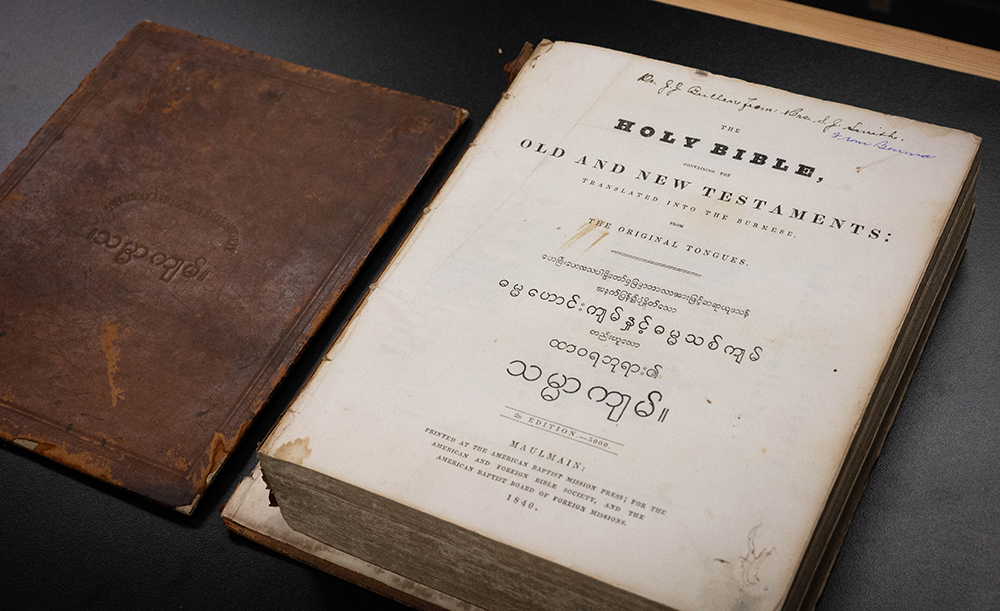
As Paul Chitwood, International Mission Board President, spoke in chapel recently at New Orleans Baptist Theological Seminary with a focus on missions, his visit coincided with the arrival at of an 1840 Burmese Bible, translated by Adoniram Judson.
Judson endured great hardship while serving in Burma (now Myanmar) for almost forty years. The Burmese Bible, second edition, will be housed and displayed at the NOBTS Museum of the Bible and Archaeology.
In chapel, Chitwood urged listeners to answer God’s call to live on mission for Christ.
“The world needs you. The world is broken and suffering. You know the One who heals, who comforts,” Chitwood said. “The world is wrecked with sin and lostness. You know the Savior. The world needs you.”
The church needs them, as well, Chitwood told the seminary audience, saying the church needs “shepherds who love the sheep; preachers and teachers who love the word; evangelists who love the lost; and missionaries who love the nations.”
Chitwood then added a surprising point – “Heaven needs you.” Drawing from Revelation 7:9-10, Chitwood explained that believers on mission are needed because heaven is not yet what it “will be.”
Every people group will be gathered around God’s throne, Chitwood explained, adding that this means every believer is called to either be a missionary or be one who mobilizes others to go. “There really aren’t any other options,” Chitwood said.
In heaven, “No nation is excluded, no tribe is excluded, no people is excluded, no language is excluded,” Chitwood said. “John uses two adjectives – ‘every’ and ‘all.’”
This is the “who” of heaven, Chitwood explained, but then pointed out that more than 3,000 people groups of the world’s 11,000 people groups remain “unreached and unengaged.”
“That’s why the church is still here,” Chitwood said, explaining that believers have a job to do. “Until the ‘who’ are there, we have a mission to carry out.”
Chitwood next posed the question of “Where?” Chitwood answered saying those in heaven stand in God’s presence, before His throne and before the Lamb of God “who loves them and does for us what we cannot do for ourselves.”
Every believer is “adopted” into God’s family, Chitwood said, and told two stories to illustrate the meaning of adoption.
In Northern Uganda, a family of five orphaned children live in a house built by Southern Baptists, Chitwood said. Though the home is without electricity or plumbing, it provides shelter and security to the children who fled war-torn Sudan on foot, led by the oldest, a 16-year-old son, Chitwood explained.
IMB missionaries have assured the children, who have known deep need and want, that “God desires to adopt them, and He’s a king,” Chitwood said.
Chitwood told also of his adopted daughter, now 9 years old, and the family’s anxiety as the time for leaving Kentucky and moving to Richmond to take the position at IMB drew near. A foster daughter at the time, the child was prohibited from leaving Kentucky until the adoption was finalized. The family grew anxious knowing they could not leave without her, Chitwood said. God answered their prayers and the adoption was finalized two weeks before the move, Chitwood explained.
“There is a Father who has made clear His plan to adopt spiritual orphans from every nation, all tribes and people, and every language of the world,” Chitwood said. “You have a job to do. You’ve been asked to be a part of the adoption process for a world whose adoption has been ‘paid in full.’”
Chitwood posed a third question of “Why?” and answered by saying that people from every tribe, people, and language are gathered around the throne for the purpose of worshiping Christ. Chitwood noted that believers’ mission is to go to the unreached so that they can worship Christ, as well.
John the Revelator’s vision of heaven makes clear the “who,” “where,” and “why” of heaven, Chitwood concluded.
“A broken and lost world needs you, the church needs you, heaven needs you because the vision has not yet been fulfilled,” Chitwood urged “Go out there. The nations are waiting.”
Adinoram Judson, with wife Ann, arrived in Burma in 1812. Judson’s first translation in Burmese, 1837, included the New Testament only. The 1840 edition, published by the American and Foreign Bible Society and the American Baptist Board of Missions, includes both the Old and the New Testaments.
Donated by Mrs. Beatrice Middleton Coker, of Eastside Baptist Church, Marietta, Ga., the donation was facilitated by Kenneth Ellison, a NOBTS alum, former missionary to the Burma region, and pastor emeritus of Eastside Baptist Church.
The Burmese Bible is a prized addition to the NOBTS Museum of the Bible and Archaeology collection that includes a page from the 1455 Gutenberg Bibles, a handwritten parchment scroll of the book of Esther, dated in the 16th to 17th century, sermon notes from John Broadus and Charles Spurgeon, and various other Bible editions and artifacts.